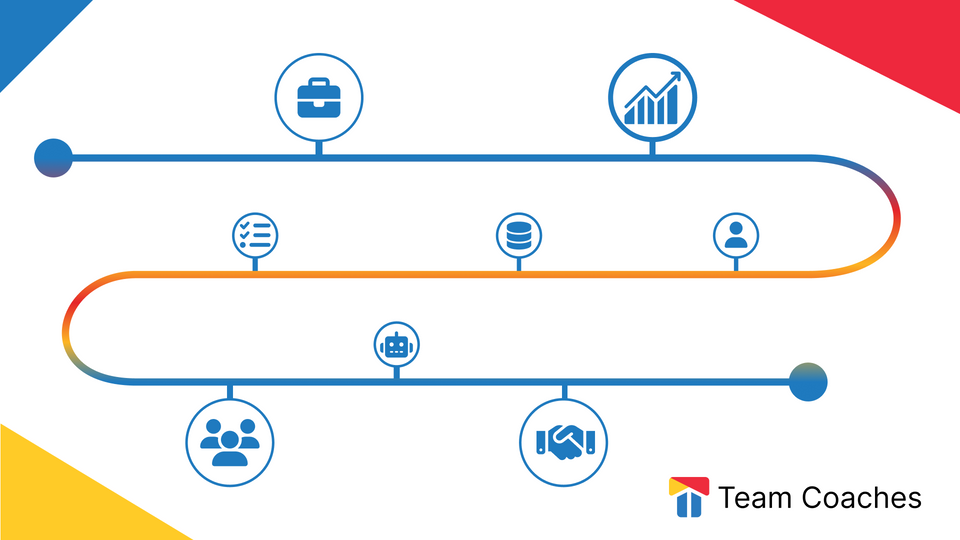Accelerators, Incubators and startup studios are part of the innovation ecosystem.
Currently there is a grow demand for this program so one way to set the path to create your own and build the community that you are looking for you need to focus on the structure.
At Team Coaches we focus our time in improving and creating the best experience for this programs to identify how best suit all the needs.
Step 1: Define what services to offer
As the first step on the creation of the program, you need to define what services you want to offer. Some examples of the offering is:
- Coaching
- Mentoring
- Education
- Events and Workshops
- Community
- Deals and Resources
- Portfolio Management / Startup tracker
- Other services focus in certain topics such as Marketing, Web Development, etc.
Step 2: Setting up the platform — Home Page
The Home page is your program within the community. Just like you have a website for marketing your products and services as any other startup you also need to do the same within the community for them to meet your demands. Some examples of content to offer is:
- Welcome video (This is the best welcoming but you can use other ways to welcome the team)
- Program support team
- Program structure
- Startup expectations
- Fine Print (explain when the startup will be out of the program if they don’t do x or y)
There is a belief that it is enough to provide the information in a document and website, but this is not the case, as you are closing an agreement with the startups you are suppose to provide the best advise possible from the first day they join.
One of the main issues of service companies that fails is because they are not focus in what is important.
Step 3: Create your community
Now more than every you need to build your community. Community building is a real complex strategy so you need to begin somewhere.
You build your community in social media like Linkedin, Facebook, Twitter, Instragram, Twitter or other platform.
These platforms are good to bring audience together but they are not good to engage with your startups, entrepreneurs, coaches, mentors and founders.
That is why you need to build you private community in your own platform where you own the content using a community software.
The first steps for building a community and get them engaged are:
- Identify content to share
- Create and share events
- Create and share content and resources
- Plan your content sharing (this is key to show constant activity)
Step 4: Coaching
A coach is a guide for your startups and yourself that helps you find the way to from all the process within the program.
It is always important to define who are these coaches. Key skills should include listening, coordination, organization, support and a wide understanding on founders needs.
Coaches don’t need to be experts in areas but have enough inside to guide them.
Step 5: Mentoring
Mentors are experts and advisors in certain areas with determine skills. Entrepreneurs get the best benefits of them when they are exploring an unknown field.
In most cases, programs have a pool of mentors that can help startups in their journey.
The skills that an entrepreneur looks for are:
- Marketing
- Design
- E-commerce
- Strategy
- Finance
- Growth hacking
These are some of the most important items that you need to take in count for your program:
- Paid or voluntary
- Skills and areas of expertise
- Estimated time that mentors needs to spend with your startups.
- Availability
- Quality of your mentors based.
All this comes together using a mentoring software solution.
Step 6: Create your Curriculum
We have found that the most efficient programs which are based only in Education have an Education Program Manager or similar role responsible to create and update their programs.
Find the right fit depends on how you are structuring your program. If you are focus on a curriculum education then each course needs to be properly curated to offer capture your audience.
Creating content is difficult so that is always recommended to curate online courses that are free to share and provide the initial guidance needed to growth your project. Al the same time you start creating your own library as you go.
Record most of the conversation that you have and you might be able excited material to share with your customer and users.
Some concepts that you need to follow while creating your curriculum:
- Structure: each lecture has their own structure. It should be based in topics with short videos, assignment, quizzes and any material that you want to share.
- Duration: how long are you planning to run this education program? What is the engagement needed from your startups? Are you looking for fast or easy pace?
- Lectures: have you created enough content to share? Do you need to look for online resource? Make sure that those videos are not trademarked.
Step 7: Events and Workshops
Events and Workshops is a way to gain followers, users and customer. It helps them to know you and your company better interacting with your audience.
Events or Workshops requires alignment in these points:
- Presentation: some visual focus with minimal amount of words, this needs to be supporting your speech.
- Workbook: in some cases it is interested to share workbook with the people joining to support their learning
- Resources: additional resources when your audience can check more out about some specific topic
- Call To Actions: make sure to provide a list of actions items to your audience
While creating the workshops make sure that the following information is provided before hand:
- Agenda
- Resources and assignment to be completed.
For each workshop you should be able to collect, rate and make sure your audience can consult your workshop data.
Step 8: Portfolio Management / Startup Tracker
Your startups, entrepreneurs and companies needs to track metrics to know where they are standing.
Depending on the objectives of your program, you will need to track what they are doing.
There are few things that needs to be clear when starting:
- What is the stage of the cohort?
- Do we follow-up daily, weekly or monthly with the startups?
- Do we create a plan with the startup or are startups independent to create their own?
- Do we define achievements for each startup?
Track and measure startups you will need a set of tools such as:
- Task Management (Project management software)
- Metrics
- OKRs
- Documents and notes storage with shared capabilities
- Calendar
Step 9: Deals and resources
Last, programs are always recognized for the deals and offers that they offer. Many times is highlighted all the good things that is bringing the program and how startup can benefits from them.
Deals are a set of credits, offers that are associated with the program or company and that helps to reduce the cost for startups.
Resources is always key to share content related to topics that are interested and build a library of curated documents, templates, videos, etc that will help the cohort within the program or the whole community.
Team Coaches works for you
Team Coaches provide a software that contains all the tools require to simplify and unify all the activities in one place and can help corporation to implement this concept and run with it during in the Accelerator Program.
An accelerator software for you!!!
If you like our product you can book a demo and we can talk about how we can fit in your programs.





